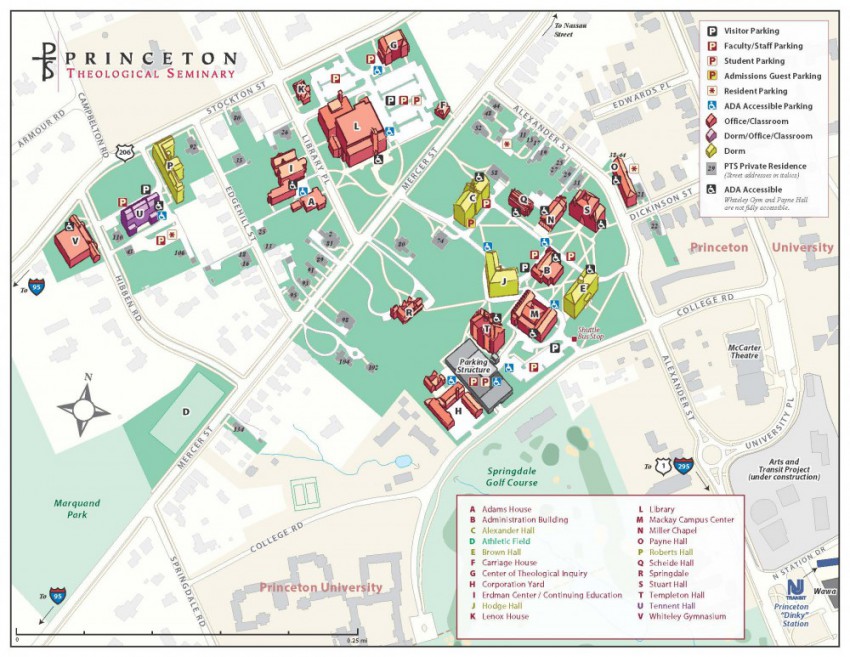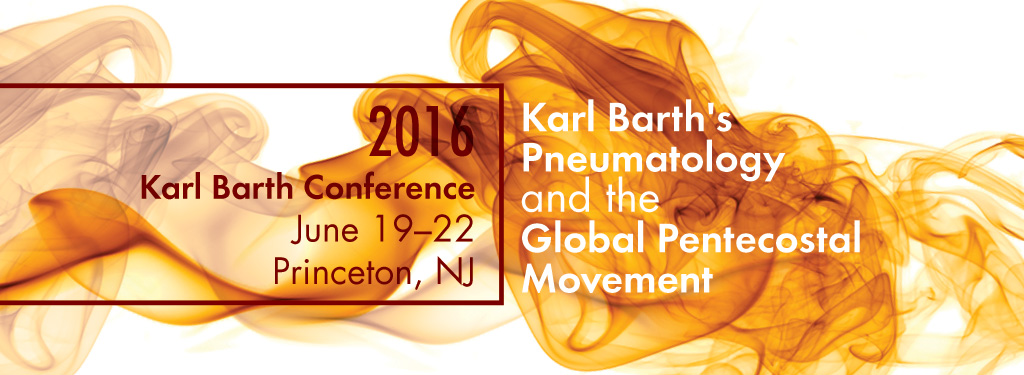
Date
Time
2016 Annual Karl Barth Conference

Karl Barth’s Pneumatology and the Global Pentecostal Movement
2016 Annual Karl Barth Conference
Princeton Theological Seminary, June 19-22, 2016
Karl Barth’s pneumatology is a contentious subject, especially when read in critical relationship to his conception of divine and human agency and his consequent understanding of the church. But how might Barth’s pneumatological contribution be interpreted in another ecclesiological context, and against another set of concerns regarding the acting of God in relation to the human? This conference sets Barth’s work within the context of world Pentecostalism and examines the potential of his pneumatology for a God wondrous and beyond all controls, and for the church as a pilgrim people gathered and send by the Spirit to witness to this God.Registration
Registration for the 2016 Annual Karl Barth Conference is now open, and can be accessed here. Please follow all instructions carefully, especially if you are registering for lodging at Erdman Center. If you have any questions or issues with registration, please use the “Email Registration Assistance” at the bottom of the registration page, or email Ivette Martell at ivette.martell@ptsem.edu. Registration Rate: $245 – includes meals Monday – Wednesday Students (Non-PTS Students): $50 – does not include meals Princeton Seminary and Princeton University Students, Staff, and Faculty: Free – no meals included Banquet (optional): The conference banquet takes place on Sunday evening and marks the opening of the annual Karl Barth conference. All registrants are welcome to attend for a cost of $30. Business-causal dress. Please note: You cannot sign up for the banquet meal when you arrive at the conference. You must register for the banquet meal prior to the conference.Plenary Speakers
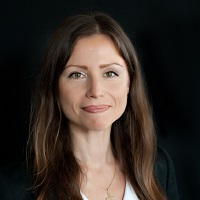
DANIELA AUGUSTINE
Dr. Daniela C. Augustine is an Associate Professor of Theological Ethics at Lee University, (Cleveland, TN). Previously, she has taught at the Bulgarian Theological College, the Pentecostal Theological Seminary (Cleveland, TN), the International Institute for Christian Studies and Charles University in Prague, Czech Republic and has served as a guest lecturer, speaker and presenter at many theological forums and educational institutions in the United States, Europe and South Africa. Augustine’s areas of academic research and publications spread over a number of subfields, including Theological Ethics, Public Theology, Interdisciplinary Studies in Social Transformation, Theology of Economics and Globalization, Religion and Culture. She serves as the Chair of the Christian Ethics Interest Group for the Society for Pentecostal Studies and as an associate editor for the Journal of Pentecostal Theology, as well as Scholar in Residence at the Centre of Pentecostal Theology in Cleveland, TN (affiliated with Bangor University, Wales). Dr. Augustine was the co-founder of the Bulgarian Theological College and the “Project Antioch” Civic Foundation in Prague, Czech Republic, and served as a missionary-educator for 11 years in Bulgaria and for seven years in the Czech Republic. She is the author of many publications, including At the Crossroads of Social Transformation: An Eastern-European Theological Perspective (2010) and Pentecost, Hospitality and Transfiguration: Toward a Spirit-inspired Vision of Social Transformation (2012).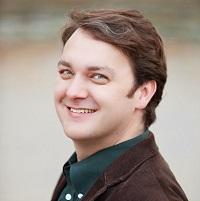 CHRISTIAN T. COLLINS WINN
CHRISTIAN T. COLLINS WINN
Christian T. Collins Winn is professor of Historical and Systematic Theology at Bethel University (St. Paul, MN). He received his PhD from Drew University, where his research focused on the influence of the Blumhardts on the Theology of Karl Barth. He is the author of “Jesus is Victor!” The Significance of the Blumhardts for the Theology of Karl Barth (2009), and The Gospel of God’s Reign: Jesus, the Kingdom, and Theological Politics (forthcoming), and co-author of Reclaiming Pietism: Retrieving an Evangelical Tradition (2014). He has edited or co-edited numerous volumes including From the Margins (2007), The Pietist Impulse in Christianity (2011), Karl Barth and the Future of Evangelical Theology (2014), Karl Barth and Comparative Theology (forthcoming), and “This Binding Alliance”: Karl Barth’s 1932-1935 Letters on Political Theology (forthcoming), and is the co-editor of The Blumhardt Series with Cascade Books. He is past president of the Pietism Studies Group in the American Society of Church History and is a member of the Scientific Advisory Board of the Blumhardt-Sozietät in Bad Boll, Germany. His research interests include the theology of Karl Barth, the life and thought of the Blumhardts, eschatology, political theology, Pietism, ecumenical theology, and interfaith dialogue. An ordained minister in the American Baptist Churches (USA), he is an active participant in church life and a member of the Convening Table for Theological Dialogue and Matters of Faith and Order in the National Council of Churches of Christ (USA).
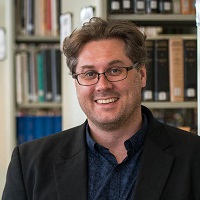 JOHN FLETT
JOHN FLETT
John Flett, originally from New Zealand, has lived and taught in the USA, South Korea, Germany, the DRC, and Australia. His PhD at Princeton Theological Seminary used Karl Barth to inform a trinitarian theology of mission (The Witness of God, Eerdmans, 2010). After completing his Habilitation at the Kirchliche Hochschule Wuppertal/Bethel on apostolicity (IVP Academic, 2016), he now teaches missiology and intercultural theology at Pilgrim Theological College, Melbourne.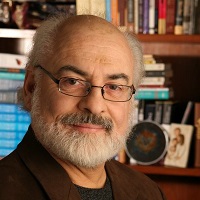 FRANK D. MACCHIA
FRANK D. MACCHIA
Frank D. Macchia is Associate Director of the Centre for Pentecostal and Charismatic Studies at Bangor University, Wales, and Professor of Christian Theology at Vanguard University. He holds the Master of Divinity from Union Theological Seminary (New York), and the Doctor of Theology from the University of Basel (Switzerland). He received his doctorate from Basel with “Distinction” and won the Jacob Burckhardt Prize for his dissertation on the message of the Blumhardts. He served as President of the Society for Pentecostal Studies and, for more than a decade, as Editor of the Society’s Journal, Pneuma. Recently (2015), he was granted the Lifetime Achievement Award by the Society for Pentecostal Studies, and the honorary doctorate (D.D.) from the Pentecostal Theological Seminary (Cleveland, TN). His ecumenical work has been both conciliar and bilateral. He served for six years on the Faith and Order Commission of the National Council of Churches (USA), and just as long on both the International Reformed-Pentecostal Dialogue, and the Oneness-Trinitarian Pentecostal conversation (where he chaired the Trinitarian team). He has also offered plenary addresses at various ecumenical venues, including the Ecumenical Institute, Strasbourg, Martin Luther University, Wittenberg, and the Community of Protestant Churches in Europe (Dusseldorf).His research interests have focused on Pietism (and Karl Barth), ecumenical issues, and several theological loci (most recently, Christology). His books include: Baptized in the Spirit: A Global Pentecostal Theology (Zondervan, 2006); Justified in the Spirit: Creation, Redemption, and the Triune God (Eerdmans, 2010); and The Trinity Practically Speaking (Intervarsity Press, 2011). Most recently, he has authored with John Christopher Thomas the commentary on the Book of Revelation for the Two Horizons Commentary Series (Eerdmans, 2015). He is currently writing a Christology for Eerdmans.
He has additionally offered numerous professional papers, and published a variety of articles, book chapters, and encyclopedia entries on a range of theological topics. He has delivered public lectures and guest lectureships at a number of seminaries and universities in both the US and abroad.
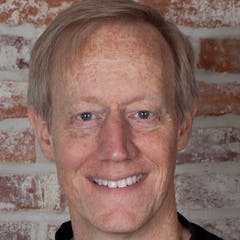
MICHAEL MCCLYMOND
Michael McClymond is Professor of Modern Christianity at Saint Louis University. He was educated at Northwestern University (B.A.), Yale University (M.Div.), and the University of Chicago (M.A.; Ph.D., Theology), and held teaching or research appointments at Wheaton College, Westmont College, the University of California–San Diego, Emory University, Yale University, and the University of Birmingham (UK). His books include Encounters With God: An Approach to the Theology of Jonathan Edwards (1998) [Brewer Prize, American Society of Church History]; co-editor (with David Noel Freedman), The Rivers of Paradise: Moses, Buddha, Confucius, Jesus, and Muhammed as Religious Founders (2001); Familiar Stranger: An Introduction to Jesus of Nazareth (2003) [Award of Merit, Christianity Today magazine]; editor,Embodying the Spirit: New Dimensions of North American Revivalism (2004); editor, Encyclopedia of Religious Revivals in America, 2 vols. (2007); co-author (with Gerald McDermott), The Theology of Jonathan Edwards (2012) [Book of the Year in Theology/Ethics, Christianity Today]; co-editor (with Lamin Sanneh),The Wiley-Blackwell Companion to World Christianity (2015); and The Devil’s Redemption: An Interpretation of the Christian Debate over Universal Salvation (2016). With Candy Gunther Brown, he received a $150,000 Templeton-funded grant to study pentecostalism in Brazil and Mozambique. He has been Co-Chair for both the Evangelical Studies and the Pentecostal-Charismatic Movements Groups in the American Academy of Religion (AAR), and Senior Scholar-in-Residence at the Overseas Ministries Study Center (OMSC).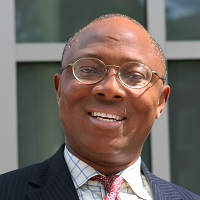
NIMI WARIBOKO
Dr. Nimi Wariboko is the Walter G. Muelder Professor of Social Ethics at Boston University School of Theology. A lively transdisciplinary thinker, he loves to unfold, refold, enfold, and energize past and present ideas and hopes in relation to the possibilities of future human flourishing. The five pillars of his scholarship are economic ethics, Christian social ethics, African social traditions, Pentecostal theology, and philosophical theology. The structure of this creative body of work, which is characterized by rigorous interweaving of original insights from each of these fields, is mapped out by the following five central titles.The Principle of Excellence: A Framework for Social Ethics presents social ethics as action-provoking-and-guiding theories of praxis and actualization of potentialities for a more flourishing, inclusive, and creatively reconciled society; the focus of God and Money: A Theology of Money in a Globalizing World is a call for an alternative, inclusive global monetary system that can better support developing economies; Ethics and Time: Ethos of Temporal Orientation in Politics and Religion of the Niger Delta explores the emancipatory core of African culture; The Pentecostal Principle: Ethical Methodology in New Spirit develops a pneumatological methodology of ethics for public policies in pluralistic communities that are open to God’s Spirit; and Economics in Spirit and Truth: A Moral Philosophy of Finance situates a social justice-oriented “care of the soul” at the intersection of radical continental philosophy, economics, and politics to craft an ethics of antifragility and potent freedom that might counter the fragilities unleashed against our socio-economic fabric by late capitalism or global finance capital.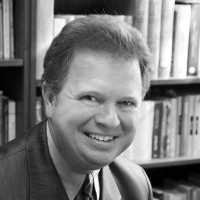
TERRY L. CROSS
Terry Cross teaches in the areas of theology and philosophy. A specialist in the work of Karl Barth, he completed his doctoral work in systematic theology. Prior to his work at Lee University, Cross was a pastor for twelve years and a high school teacher of Latin and history. He was awarded the Excellence in Teaching Award at Lee University in May 2000 and the Excellence in Scholarship Award in May 2001. He is the author of Dialectic in Karl Barth’s Doctrine of God, Answering the Call in the Spirit: Pentecostal Reflection on a Theology of Vocation, Work, and Life. Currently, Cross is completing a book on ecclesiology entitled, The Church: A People of God’s Presence and Power. Cross graduated from Lee in 1978, earning the first of several degrees. He later received the M.A. in Church History and the M.Div. in Theology from Ashland Theological Seminary (Ohio). From Ashland, he moved to Princeton Theological Seminary, where he received the Th.M. in Doctrinal Theology and the Ph.D. in Systematic Theology (1991). In the summer of 2002, Cross became the dean of the School of Religion. Terry and his wife, Linda, have one daughter, Tara. Aside from golf, tennis, and racquetball, he enjoys genealogy and Latin.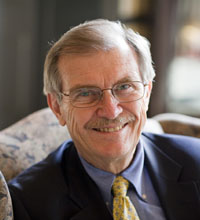
DARRELL GUDER
Darrell Guder is Princeton Theological Seminary’s Henry Winters Luce Emeritus Professor of Missional and Ecumenical Theology. He received his Ph.D. from the University of Hamburg. As an ordained Presbyterian minister, he has served in the German Lutheran Church doing outreach to youth and teaching in a training college for church workers; he directed the Institute of Youth Ministries of Young Life and Fuller Seminary; he served as vice-president of academic affairs and academic dean of Whitworth University; and he has taught as a missiologist at Louisville Presbyterian Theological Seminary and Columbia Theological Seminary before joining Princeton’s faculty in 2002. His writing and teaching focus on the theology of the missional church, especially the theological implications of the paradigm shift to post-Christendom as the context for Christian mission in the West. One of his major research interests is reading Barth as a missional theologian. He has served as secretary-treasurer of the American Society of Missiology (ASM) and was its president from 2007–2008. His scholarly translations include Otto Weber, Foundations of Dogmatics (2 vols.); Eberhard Jüngel, God as the Mystery of the World; Karl Barth, The Theology of the Reformed Confessions (with Judith Guder and Eberhard Busch), The Great Passion: An Introduction to the Theology of Karl Barth (with Judith Guder). He also coordinates the annual Barth Translator’s Seminar every June immediately following the annual Karl Barth conference. In retirement he serves as Senior Fellow in Residence at St. Andrew’s Hall, Vancouver, working with its Centre for Missional Leadership. He chairs both the board of the Gospel and Our Culture Network and the Advisory Board of Macedonian Ministries.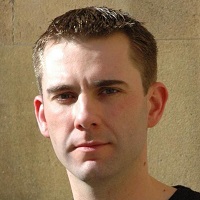
PAUL T. NIMMO
Paul Nimmo holds the King’s (1620) Chair of Systematic Theology at the University of Aberdeen, having previously held positions at the University of Cambridge and the University of Edinburgh. His studies were undertaken at the University of Cambridge, the University of Edinburgh, Princeton Theological Seminary, and the Eberhard Karls Universität Tübingen. His first monograph, Being in Action: The Theological Shape of Barth’s Ethical Vision, was awarded a John Templeton Award for Theological Promise in 2009, and he has since published Barth: A Guide for the Perplexed, co-edited The Cambridge Companion to Reformed Theology, and edited the church resource Learn: Understanding Our Faith. He served as Managing Editor and then Editor of the International Journal of Systematic Theology for a decade, before becoming its Senior Editor in 2016; he also serves as the current co-Chair of the AAR Reformed Theology and History Group Steering Committee, having been a Member of the same since 2012, and as a member of the AAR Friedrich Schleiermacher Group. He served on the Steering Committee of the Society for the Study of Theology between 2008 and 2011, and as the Society’s Treasurer from 2013 to 2016. He is an ordained elder in the Church of Scotland, and participates in diverse ways in the life of the church, at both local and national levels.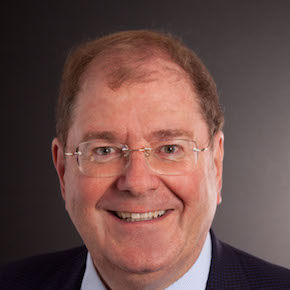
MICHAEL WELKER
Michael Welker, Dr. theol.; Dr. phil.; Dr. theol. h.c., Dr. phil. h.c., is a Senior Professor at the University of Heidelberg (since 2013) and Director of the Research Center International and Interdisciplinary Theology (FIIT Heidelberg, since 2005); Honorary Professor at Seoul Theological University. He is a member of the Heidelberg Academy of Sciences and Humanities, and Corresponding Member of the Finnish Academy of Science and Letters. He received the Karl Barth Preis (award) in 2016. In 1983, he was a Professor in Tübingen; 1987 Chair of Reformed Theology in Münster; 1991-2013 Chair of Systematic Theology in Heidelberg. He has held various guest-professorships at McMaster University, Canada; Princeton Theological Seminary (twice) and Senior Consultant Scholar at the CTI (twice); Harvard Divinity School; Cambridge Divinity School; Center for the Study of Law and Religion at Emory University along with many endowed lectures in Europe, South Africa, Asia, and the USA. Professor Welker has written and published over 350 articles in journals and books. He is author or editor of about 50 books, including God the Spirit (1994); (ed.), The Work of the Spirit: Pneumatology and Pentecostalism (2006); (ed.), The Spirit in Creation and New Creation: Science and Theology in Western and Orthodox Realms (2012); God’s Revelation: Christology (2012); Creation and Reality (Warfield Lectures 1995); What Happens in Holy Communion? (2000); with John Polkinghorne, Faith in the Living God (2001); The Science and Theology Dialogue: What Can Theology Contribute (Taylor Lectures 2012). He is the co-editor of several books on the Future of Reformed Theology and organizer of multi-year international and interdisciplinary research projects: With John Polkinghorne (eds.), The End of the World and the Ends of God: Science and Theology on Eschatology (2000); with Gregor Etzelmueller (eds.), Concepts of Law in the Sciences, Legal Studies and Theology (2013); with Juergen von Hagen (eds.), Money as God? The Monetization of the Market and the Impacts on Politics, Law, Religion and Ethics (2014); (ed.), The Depth of the Human Person: A Multi-Disciplinary Approach (2014); (ed.), Quests for Freedom: Biblical – Historical – Contemporary (2015); with William Schweiker (eds.), Images of the Divine and Cultural Orientations: Jewish, Christian, and Islamic Voices (2015).Concurrent Speakers
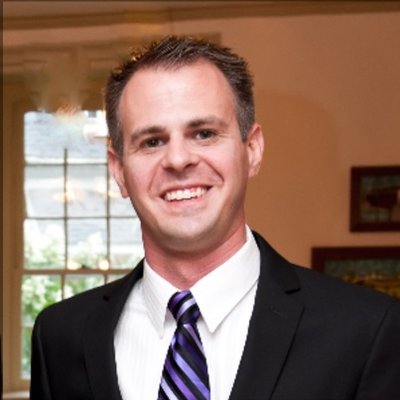
DAVID BRADNICK
David Bradnick is a lecturer in philosophy at Stevenson University and York College of Pennsylvania. He earned a Ph.D. in theological studies from Regent University School of Divinity, and his dissertation is entitled “Loosing and Binding the Spirits: An Emergentist Theology of the Demonic.” His publications include “From the Protestant Era to the Pentecostal Era: An Intersection of Tillichian and Pentecostal Demonologies and Its Implications” in Paul Tillich and Pentecostal Theology (2015) and “Spirits and the Stars: A Spirit-Filled Cosmology” in Loosing the Spirits: Interdisciplinary and Religio-Cultural Discourses on a Spirit-Filled World (2013). He has also published articles in Zygon: Journal of Religion and Science as well as Theology and Science. He and his wife, Brigitte have two children, Leah and Gabriel.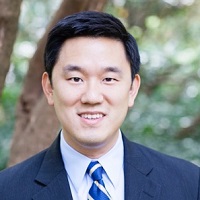
DAVID CHAO
David C. Chao is a Ph.D. candidate in theology at Princeton Theological Seminary. He has degrees from Yale University (BA), Regent College (MDiv), and Princeton Theological Seminary (ThM). He has published in Zeitschrift für dialektische Theologie, is co-editor of a three-volume work on Karl Barth’s conversations (1959-1968), and taught at Princeton Theological Seminary and Princeton University. He is currently completing a dissertation on the relation of nature and grace in Karl Barth’s doctrine of providence. His research interests include Protestant and Catholic dogmatics (especially as they pertain to issues of nature and grace), Reformed theology, and Asian American theology.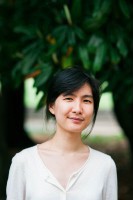
SAMANTHA FONG
Samantha Fong is a doctoral student in Christian Theology and Ethics in the Religion Department of Duke University. She is interested in the intersection of systematic theology, pentecostal-charismatic Christianity, and decoloniality, which her dissertation will explore in the setting of contemporary Singapore.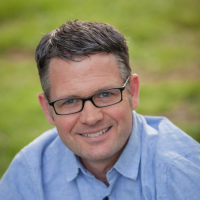
TIM HARTMAN
Tim Hartman is assistant professor of theology at Columbia Theological Seminary. He holds a BA from Stanford University, a MDiv from Princeton Theological Seminary, and a PhD from the University of Virginia and is an ordained Teaching Elder in the Presbyterian Church (USA). His research interests include contemporary Christian theologies worldwide, Christology, African Christianity, Lived Theology—the interrelationship between religious beliefs and practices, and the works of Kwame Bediako and Karl Barth. His current book project is tentatively titled: Theology after Christendom: Divine Revelation with Kwame Bediako and Karl Barth.
DANIEL MCDOWELL
Daniel McDowell is a PhD student at the University of Aberdeen working under Professor Paul Nimmo on the doctrine of the Holy Spirit in the theology of Friedrich Schleiermacher and Karl Barth. He is an ordained ruling elder in the Presbyterian Church (USA), currently serving on session at historic First Presbyterian Church “Old South” in Newburyport MA, and on the Pastoral Nominating Committee there as well. He is also under care of the Presbytery of Northern New England as he pursues pastoral ordination. He was educated at Central Washington University (B.A., history), and Gordon-Conwell Theological Seminary (M.A., Theology; MDiv.; ThM, Theology), where he also worked as a Byington Scholar and the Semlink Theology Teaching Fellow. He has been married for ten years and has two children: ages three years and three weeks.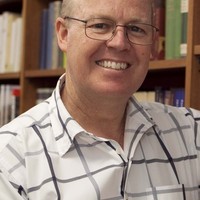
MICHAEL O’NEIL
Dr. Michael D. O’Neil teaches theology and directs the postgraduate study programme of Vose Seminary in Perth, Western Australia. Vose Seminary is an affiliate institution of the Australian College of Theology. He is the author of Church as Moral Community: Karl Barth’s Vision of Christian Life,1915-1922 (Milton Keynes: Paternoster, 2013), and blogs at theologyandchurch.com. Before commencing his role at Vose Seminary, Michael was engaged in pastoral ministry for over twenty years. Michael is married to Monica, and together they have three adult children. A copy of his Curriculum Vitae and various shorter publications are available at https://vose.academia.edu/MichaelONeil.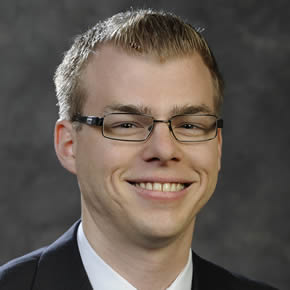
BEN RHODES
Dr. Ben Rhodes has been the Manager and Resident Research Scholar, Academic Studies Department, Christian Institute on Disability at the Joni and Friends International Disability Center since 2012. Among other responsibilities, Dr. Rhodes helps oversee all international education and training at Joni and Friends. He holds a PhD in systematic theology from the University of Aberdeen in Scotland, and teaches at the Talbot School of Theology at Biola University when he is not traveling with Joni and Friends.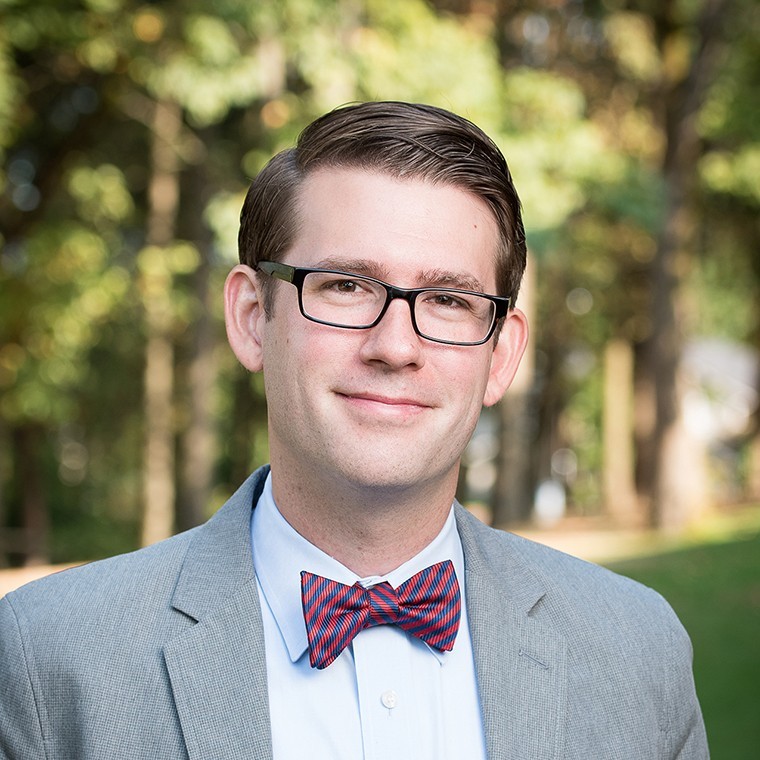
JOSHUA R. ZIEFLE
Joshua R. Ziefle is an Associate Professor and the Director of the Center for Calling and Theological Formation at Northwest University in Kirkland, Washington. His teaching responsibilities are in the areas of ministry and history. He is a graduate of Princeton Theological Seminary, where he earned an MDiv in 2005 before completing a PhD in Church History in 2011. His dissertation, published as a monograph by Brill in 2012, was entitled “The Place of Pentecost: David Johannes du Plessis, the Assemblies of God, and the Development of Ecumenical Pentecostalism.” Joshua’s research interests include the history of Pentecostalism and the Charismatic Renewal, the ecumenical potential inherent in renewal-based Christianity, and American Christianity broadly. Most recently, he is the author of a chapter on “The Charismatic Renewal” in the Handbook on Global Contemporary Christianity: History, Diversity, Complexity. Joshua is an ordained minister in the Assemblies of God and serves on the teaching team in his local congregation. Though currently on hiatus, he has blogged regularly on history, politics, theology, and other topics at www.joshuaziefle.net. He and his wife Rachel live outside of Seattle.Schedule
This schedule is preliminary and subject to extensive change and revision as the conference nears.Sunday, June 19th, 2016
2:00 – 5:00 PM – Registration (Erdman Center) 6:00 – 7:30 PM – Opening Banquet (Mackay Dining Hall) 7:30 – 9:00 PM – Michael Welker: The Spirit and Creation (Stuart Hall 6)Monday, June 20th, 2016
8:00 – 9:00 AM – Breakfast (Mackay Dining Hall) 9:00 – 10:00 AM – Nimi Warikobo: The Spirit and Ethics (Stuart Hall 6) 10:15 – 10:45 AM – Break (Coffee available in Stuart Hall basement) 11:00 – Noon – Jessica DeCou: The Spirit and Spirituality (Stuart Hall 6) Noon – 1:00 PM – Lunch 1:00 – 1:30 PM – Worship Service – Darrell Guder, preacher (Miller Chapel) 2:00 – 3:00 – Christian Collins Winn: Karl Barth, Eschatology and Pietism (Stuart Hall 6) 3:00 – 3:30 – Break (Coffee and refreshments available in Stuart Hall basement) 3:30 – 4:30 – Concurrent Session I- Samantha Fong – Stuart Hall 1
- David Bradnick – Stuart Hall 2
- Tim Hartman – Stuart Hall 3
- Ben Rhodes – Stuart Hall 4
Tuesday, June 21st, 2016
8:00 – 9:00 AM – Breakfast (Mackay Dining Hall) 9:00 – 10:00 AM – Frank Macchia: Christ and the Spirit (Stuart Hall 6) 10:15 – 10:45 AM – Break (Coffee available in Stuart Hall basement) 11:00 – Noon – Daniela Augustine: ‘The Ever-coming’ Spirit: Eastern-European Pentecostal Reflections on Christoformation and Barth’s Eschatological Pneumatology (Stuart Hall 6) Noon – 1:00 PM—Lunch (Mackay Dining Hall) 1:00 – 1:30 PM – Worship Service – Darrell Guder, preacher (Miller Chapel) 2:00 – 3:00 – John G. Flett: Evil, Demons, and Exorcism (Stuart Hall 6) 3:00 – 3:30 – Break (Coffee and refreshments are available in Stuart Hall basement) 3:30 – 4:30 – Concurrent Session II- Daniel McDowell – Stuart Hall 1
- Michael O’Neil – Stuart Hall 2
- David Chao – Stuart Hall 3
- Joshua Ziefle – Stuart Hall 4
Wednesday, June 22nd, 2016
8:00 – 9:00 AM – Breakfast (Mackay Dining Hall) 9:00 – 10:00 AM – Michael McClymond: How the Spirit in Barth Pertains to the Work of Christ (Stuart Hall 6) 10:00 – 11:00 AM – Break – Check out from the Erdman Center by 11 AM (Coffee available in the Stuart Hall basement) 11:00 – Noon – Concluding Dialogue between Paul Nimmo and Terry Cross (Stuart Hall 6) Noon – 1:00 PM – Lunch (Mackay Dining Hall)LODGING
Lodging will be available again this year at Princeton Seminary’s Erdman Center. Details about the Erdman Center can be found here. The nightly lodging rates range from $55-$90 depending upon the room you choose. Please note that the conference will begin early on Monday morning so we advise a Sunday stay. The registration fee does not include lodging charges. All charges for lodging at the Erdman Center are separate and paid upon arrival at the Erdman Center.MAPS AND DIRECTIONS
By Air
From Newark Liberty International Airport The Olympic Airporter shuttle service takes you to the Nassau Inn in Princeton; call for schedule and reservations: 800.822.9797 (within the United States) or 732.938.6666 (outside the United States), or visit www.olympicairporter.com The AirTrain takes you from all airport terminals to the Newark Liberty International Airport Train Station. Take New Jersey Transit southbound (Northeast Corridor Line) trains to Princeton Junction. From Princeton Junction take the train to Princeton Station. From Philadelphia International Airport Take the R1 High Speed Rail Line (entrance on pedestrian bridges and commercial roadway), limousine service (The Olympic Airporter; call for reservations: 800.822.9797 within the United States or 732.938.6666 outside the United States, or visitwww.olympicairporter.com), or local taxi service to 30th Street Station in Philadelphia, where you can purchase a SEPTA/New Jersey Transit ticket to take a SEPTA train to Trenton and a New Jersey Transit train to Princeton Junction. From Princeton Junction take the train to Princeton Station. From Port Authority Bus Terminal in New York City (41st Street and 8th Avenue)By Bus
Purchase a Suburban Transit bus ticket to Princeton at windows 16 through 19 on the first floor. Board the bus on the third floor (fourth level) at gates 420 through 422. The bus leaves every half hour between 6:00 a.m. and 11:00 p.m. on weekdays and between 9:00 a.m. and 11:00 p.m. on weekends, and every half hour on the hour until 1:00 a.m. The trip is one and one-half hours. Ask the driver to let you off at the end of Nassau Street where it meets Mercer Street and Route 206 in Princeton, and walk to the Seminary. From New York City (and north) and Philadelphia (and south)By Train
New Jersey Transit services Princeton from the north (New York City, Newark), with connecting service from the south (Trenton, Philadelphia, Baltimore, Washington DC). Amtrak trains stop in Trenton, and some at Princeton Junction. From the North/New York CityBy Car
Take the New Jersey Turnpike South to Exit 9 (New Brunswick). After the tollbooths, bear right onto the ramp for Route 18 North. Shortly after getting onto Route 18 North the road will fork; stay to the left of the fork, in the right lane. Bear right onto this exit for Route 1 South/Trenton. Follow Route 1 South to Alexander Road (Princeton). Turn right onto Alexander Road and continue to the entrance of Princeton Seminary, which is the first left turn after College Road (Alexander Road will be Alexander Street at this point). From the West Take I-78 East into New Jersey. Exit onto I-287 South toward Somerville. Follow signs for Routes 202/206 South. Travel south on 202 for a short distance and then follow signs for Route 206 South. You will go around a traffic circle. Continue south on Route 206 for about eighteen miles to Nassau Street (Route 27) in the center of Princeton. Turn left onto Nassau Street and the first right onto Mercer Street and continue to the main entrance of Princeton Seminary, which will be on your left. From the South From southern New Jersey take I-295 North (becomes I-95 South) to the “Princeton Pike North” exit and continue on Princeton Pike for approximately five miles. Immediately after passing Library Place (on the left), the main entrance to the campus will be on your right. From the East Take I-95 West toward Trenton to the exit for I-295 North (becomes I-95 South) to the “Princeton Pike North” exit and continue on Princeton Pike for approximately five miles. Immediately after passing Library Place (on the left), the main entrance to the campus will be on your right. From Philadelphia Take I-95 North into New Jersey and exit at “Princeton Pike North” and continue on Princeton Pike for approximately five miles. Immediately after passing Library Place (on the left), the main entrance to the campus will be on your right. A detailed map of Princeton Theological Seminary is shown below.Princeton Seminary Main Campus Map
